by Sr. Rita Kelly, MMM Ireland 01.11.2025
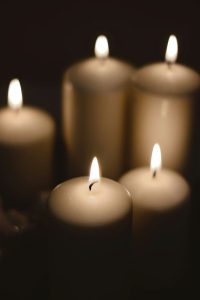 I read an article on the internet with the above heading “Making the dead welcome- All Soul’s Day in Ireland” (cf. IrishCentral). I immediately remembered my time in Mexico many years ago.
I read an article on the internet with the above heading “Making the dead welcome- All Soul’s Day in Ireland” (cf. IrishCentral). I immediately remembered my time in Mexico many years ago.
I was staying with a Mexican family studying Spanish. On 2nd November I was amazed at the Mexican tradition of commemorating their Dead. It was truly a day of celebration. They celebrate the day as EL Dia de Los Muertos (The Day of the Dead). The family set a special table for their deceased. It was a feast, food that the deceased would like, also drinks and cigars. Skeletons were dressed in the good clothes of the deceased relatives.
Looking back on my own memories, in Ireland, I had an image of myself as child with other children going in and out of the Church saying prayers for the dead. It was a day of memories, but I did not remember it as a day of celebration. Somehow there was a sense of sadness. I have a memory of an uncle telling us ghost stories around the fire. Of course, in Mexico, the sun is shining, but November, in Ireland, in the Northern Hemisphere, the days are getting shorter and darker. Some traditions here may have died down, but for three days there are practices and rituals for Halloween – “Samhain”, All Saints Day and Holy Souls’ Day (31st October, 1st November and 2nd November) remaining from our Celtic tradition.
In the Celtic tradition, very like the Mexican tradition, it was believed that the souls of the dead would return to their family home on Holy Souls’ Night. Great care was taken to make sure they were welcomed. To welcome the dead, floors were swept and a good fire lit. They would set a place at the dinner table for each deceased relative. Cemeteries were visited. Graves were cleaned and prayers were said. Candles were lit for those who had passed. On Holy Soul’s Night the door of the house was always left unlocked.
Today, Holy Souls’ Day remains a day of commemoration. In the parishes we will attend Mass, prayers will be said for our dearly beloved. Cemeteries will be visited. Here in Drogheda, people meet in the local cemetery to say the rosary daily,
Also, families have their own traditions for remembering their loved ones. In my own family, we will arrange a day to meet to attend Mass, to visit the graves and to share a meal. November is more poignant now, as my mother died on 20th November 2001. It was my mother who started the family tradition when my father died in 1979.
I am grateful for this time to remember our dead, the people who passed through our lives who were present and part of our history. But we also pray for those who have died who have no one to remember them.
We pray:
“Eternal Rest, grant unto them, O Lord,
And let perpetual light shine upon them
May they rest in peace” Amen.
by Sr. Margaret Anne Meyer, MMM USA 29.10.2025
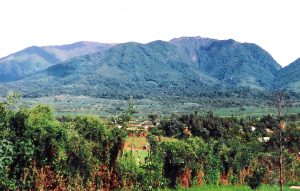 Yes, the Christmas celebration at Dareda was very breathtaking to behold the deep faith of the people who came from far and near to fill the Cathedral-like church adorned with Connemara marble and festive banners tied between the large columns. All this brought me close to the people and after four months I was beginning to settle in the place.
Yes, the Christmas celebration at Dareda was very breathtaking to behold the deep faith of the people who came from far and near to fill the Cathedral-like church adorned with Connemara marble and festive banners tied between the large columns. All this brought me close to the people and after four months I was beginning to settle in the place.
There was an established routine which seemed to work most of the time but as usual in the medical field emergencies can topple the best intentions.
The Medical Assistants were very capable. Sr. Doctor Maureen Mc Dermott was medical officer in charge and held a meeting at 8:45AM to hear the report of the night admissions and who it may be serious for us to see. We were kept busy with ward rounds, operations, and difficult deliveries. For a few hours every day, one of us did Out Patients. We alternated night call. I loved our cup of coffee in the wee hours of the night before doing a Caesarean Section. Maureen was very skilled in surgery, and she taught me many things. I loved working with her.
To celebrate, New Years Eve, Maureen and a few of the Sisters went to the Maryknoll Sisters who headed an agricultural school near Mt Hanang. They had an enjoyable time. A few nights later, a boy of 14 years was gored by a buffalo and air was escaping out of a hole under his heart. We took him to the theater and found that his right lung had collapsed. We thanked God that his heart was not injured at all and continued to beat very well. We closed the hole and inserted an underwater seal into his pleural cavity. Slowly his lungs began to expand. After a week, the seal was removed, and his lungs were normal. We were incredibly grateful to God.
Upon finishing, a woman with obstructed labor came. The baby was dead, and her uterus was very damaged. She needed a hysterectomy which we did. Then afterwards a man came with intestinal obstruction. By this time, it was 3:30 AM and we decided we would observe him with an IV drip and nasogastric suction. We thought we were finished for the night when another man walked in whose scalp had been split open by a machete. A medical assistant had pity on us and sutured the man’s scalp. By the time the sun rose that morning, all four patients were doing well.
We were incredibly grateful to God. I do not remember having another night as busy as that one and I was extremely glad Maureen was with me dealing with all these emergencies.
We were both delighted that in a few weeks another doctor would be coming to help us but that is another story.
by Sr. Sheila Campbell MMM Ireland 25.10.2025
 Christine was 13 years old and living on a small farm in the West of Ireland. She went to the local school which was not State-funded but had to generate its own income to meet the overheads and pay the teachers. The school had a monthly fundraiser – a whist drive. It was also an important social event in a rural community!
Christine was 13 years old and living on a small farm in the West of Ireland. She went to the local school which was not State-funded but had to generate its own income to meet the overheads and pay the teachers. The school had a monthly fundraiser – a whist drive. It was also an important social event in a rural community!
One day at school her classmate jeered her. “You never bring a prize for the whist drive. This month my mother baked a cake.” Chris thought hard. “I can bring a prize too”, she said. “I can get a turkey!”
Off she went home and asked her mother if she could have a turkey for the school. The parents raised turkeys to provide a little bit of extra income at Christmas time. “Yes”, said her mother, “Come and we will pick one.” That’s how Chris learnt about turkeys, how to choose a good one by pressing the breastbone to see the level of nutrition. “I will have one ready for you in the morning.”
Early next morning Chris was excited about bringing the turkey to school. She got up early, long before anyone else was about. But alas, it had snowed all night, and it was hard to open the shed without shovelling first. But she struggled to get her bike out, found the bag with the frightened looking turkey and she strapped it to the carrier of the bike and set off walking to the village. It was a fair distance away, over three miles. No chance of riding as the road was almost impassable. It was still snowing but she was a determined little girl. She wanted the turkey for the school.
When she eventually got to the village everything was quiet. The school was closed, the church was closed, and the entire village was still sleeping. Chris decided to visit her cousins. Her aunt got a fright when she saw her – “is it bad news? Has somebody died?” “Well, he is almost dead”, she said, pointing to the turkey. “His neck is blue.” Her aunt saw the situation and came up with a solution. Her husband was a butcher. He would finish the job, prepare the turkey and keep it in the freezer until the day of the whist drive.
Chris never forgot that journey. It was tough, but she was determined. The episode stood her to good stead many years later when she had to face bad roads in Nigeria to bring healthcare to the most vulnerable.
by Sr. Rita Higgins, MMM Ireland 22.10.2025
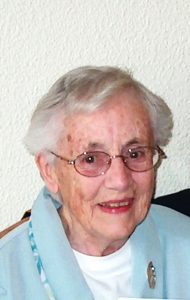 Recently I was sorting out some photos for the family of the late Sr. Pauline Dean, MMM, who died 3rd February this year, aged 103, in Aras Mhuire Nursing Home. Among the photos was a large black and white one, taken during World War 2 days when Pauline was a medical student. On the back of the photo was her careful note naming the people in the photo, Millicent, Pauline, Steven and Helen. Helen, I knew, was Pauline’s younger sister.
Recently I was sorting out some photos for the family of the late Sr. Pauline Dean, MMM, who died 3rd February this year, aged 103, in Aras Mhuire Nursing Home. Among the photos was a large black and white one, taken during World War 2 days when Pauline was a medical student. On the back of the photo was her careful note naming the people in the photo, Millicent, Pauline, Steven and Helen. Helen, I knew, was Pauline’s younger sister.
How to describe Pauline? Pauline was English, and, in spite of living in multicultural communities all her life, she never lost her British accent. She was a medical doctor and paediatrician, but her talents went well beyond her professional role. She was a published author, a gifted artist, a natural actor, and with a wonderful sense of timing, could have made a career as a stand-up comedian!
Pauline was a doctor before joining MMM. This is the nub of the story. She went to the USA to study Paediatrics and somehow met two MMMs when they needed help with a puncture. They invited her to visit them in our house in Winchester MA, and as they say, the rest is history! Pauline spent her early missionary life in Nigeria and finally ended up in Kenya. She left Kenya finally when she was 81.
After looking at the photo I found, I began a conversation with some of the Health Care attendants who knew and loved Pauline, showing the photo and reading out the names. One of the Carers, Amy, said to me: “Oh, let me see Steven.” I was puzzled and asked: “How do you know Steven?”
She said that when they asked Pauline about her early life, Pauline often talked about a young man named Steven who she was very fond of and how he had gone to war and never returned. Amy said that Pauline wondered what might have been her life if he had returned.
As we looked anew at the photo, we were struck by the mystery of how life events influence our paths. In our conversation, Amy’s telling of Pauline’s story and the discovery of the precious photo came together, giving us all a precious memory and a story long forgotten and lost was restored.
by a MMM Pre-Med Student 1948 Ireland 18.10.2025
 Tick! Tick! Tick! Inexorably the clock ticked on, every moment bringing me nearer to nine o’clock, and to my anatomy lesson and my first dogfish. Vainly I tried to persuade myself that dogfish were only a particularly objectionable kind of fish, but my heart was two to the beat as I mounted the stairs to the Zoology Theatre. My imagination would persist in in unfolding lurid pictures in which the scalpel was not in my hands but in the fins of the dogfish.
Tick! Tick! Tick! Inexorably the clock ticked on, every moment bringing me nearer to nine o’clock, and to my anatomy lesson and my first dogfish. Vainly I tried to persuade myself that dogfish were only a particularly objectionable kind of fish, but my heart was two to the beat as I mounted the stairs to the Zoology Theatre. My imagination would persist in in unfolding lurid pictures in which the scalpel was not in my hands but in the fins of the dogfish.
As I walked to my desk, mu knees were shaky, but I sat down and waited for the next move. This came more quickly than I expected. Glancing down at my desk, I saw that Scillium Canicula was already enthroned on the dissecting board. I nearly hopped off the high stool when I saw it. He lay in an attitude of passive submission. Though his caudal fin was missing, I was not reassured. I edged my stool nearer, inch by inch, until I had placed the width of a desk between myself and the object of my disgust. Assuming the air of nonchalance, I tried to appear unaware of the presence of the dogfish, but I had one eye on it and the other on the door. I believed discretion to be the better part of valour, and at the least evidence of life, I was ready to take to my heels.
As the attendant was passing my desk, she said, “Turn your dogfish over to the ventral position.” Summoning up my courage, I touched the fish. It was clammy and cold, so I pulled my finger away again. “Come on, it doesn’t bite, you know,” said the attendant jokingly. Gritting my teeth, I pulled at the specimen, but it only hovered for a moment and flapped down into its former position. The attendant was standing by with a look of tolerant amusement on her face and the other students were casting curious glances in my direction, so, with a do-or-die expression, I jerked at the innocent cause of my disturbance.
But I jerked too hard, and the dogfish flashed through the air and landed with a splash on the neck of the student across the way. The student yelped and jumped aside, knocking down his neighbour who grabbed at a dissecting board to save himself. The two students and Scillium Canicula were wrapped in close interest, and by the time the attendant had disentangled them Scillium Canicula’s career as “Uni. specimen” was over.
Amidst suppressed laughter from the other students, I recovered the remains of the dogfish and my dignity, and the lesson was continued. The attendant, more in sorrow than in anger, suggested that I should use a forceps when handling a dogfish in future. I then remembered with a start that I had not remembered to bring my instruments with me.
However, by that evening, I had forgotten my unpleasant experience and cycling home form College, I was ravenously hungry. I was looking forward to supper. I sat down at table wit a slight aroma of dogfish still about me, but I resolutely ignored it. But soon a horrible suspicion dawned, and I knew the worst had happened when a third Year Medical Student callously exclaimed, “Fishcakes for supper! Great, isn’t it?” –
by Nadia Ramoutar MMM Communications Coordinator Ireland 15.10.2025
 As a little girl growing up in Dublin long before social media and screens on phones, I was transported to the wilds of Africa watching Jane Goodall on television. I would sit transfixed. How was she so calm, so gentle and comfortable in the wild? How had she gotten there from a childhood in England? Was she not afraid of this place and these wild animals? She was and has remained a role model for global advocacy of the natural world and being a steward of our Earth. When she died on 1st October, 2025 I cried as if a precious aunt had passed away and I was not ready to say goodbye.
As a little girl growing up in Dublin long before social media and screens on phones, I was transported to the wilds of Africa watching Jane Goodall on television. I would sit transfixed. How was she so calm, so gentle and comfortable in the wild? How had she gotten there from a childhood in England? Was she not afraid of this place and these wild animals? She was and has remained a role model for global advocacy of the natural world and being a steward of our Earth. When she died on 1st October, 2025 I cried as if a precious aunt had passed away and I was not ready to say goodbye.
My early fascination with Jane Goodall was no accident as she wisely believed that it was important to engage children about conservation and preservation early on. She wrote many children’s and adult books in her time but she realised that to really make the world better we need to reach people early in life. “What you do makes a difference, and you have to decide what kind of difference you want to make?” She wisely said and I paid attention.
Two years ago a life dream came true for me and I was in beautiful Tanzania visiting the amazing MMM Missions there. I saw where the Jane Goodall Institute was being constructed. What a shame it would not be open by the time I was leaving. I really wanted to go inside and explore the legacy of this great women. Dr Goodall’s relationship to the animal world was expanded to the human world as she aged realising the harm and damage humans were doing to habitats.
As the world mourns Jane Goodall’s passing, there is much to celebrate in her call for us to be a better human kind. In her 80s and even when she turned 90, Jane worked 300 days a year to try and convince people to care and to not let this important moment in time go by without making the world care. “Above all, we must realise that each of us makes a different with our life. Each of us impacts the world around us every single day. We have a choice to use the gift of our life to make the world a better place – or not to bother.”
Her words resonate with me and I know in my heart despite my efforts, I have not done enough to make the world a better place – Have you? What else can we do? The great woman has gone to her resting place making every moment count. She has lovingly passed the baton on to those of us who remain. We must, as best we can, hold it tight and go the next leg of the journey with all our heart.
by Sr. Margaret Anne Meyer MMM USA 13.10.2025
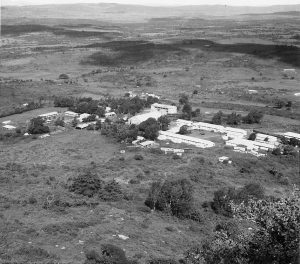 In August 1978, I was asked to leave Makiungu and go to Dareda Hospital, about sixty miles away. The surgeon there had finished his two-year contract and was going home with his wife and newborn baby. Sr. Doctor Maureen Mc Dermott had asked me to come and help her.
In August 1978, I was asked to leave Makiungu and go to Dareda Hospital, about sixty miles away. The surgeon there had finished his two-year contract and was going home with his wife and newborn baby. Sr. Doctor Maureen Mc Dermott had asked me to come and help her.
Dareda was a Government-designated District Hospital which meant that the people did not pay for their medical stay or medicine, and the Government paid the Staff salaries. This meant that we were inundated with patients. Sometimes our bed count was over three hundred. I was sorry to leave Dr. Rachel Patton behind in Makiungu Hospital, but she managed very well. She was able to perform extremely complicated surgery. She was able to save the life of a baby who was born without an anus.
The change was not as difficult as leaving Uganda. Instead of living in a semi-desert area the volcanic soil was red and seemed to lodge in the hems of our white coats. Our home was surrounded by rose bushes and the garden produced many varieties of fruits and vegetables. At times I could loll on the green grass lawn on a blanket with an enjoyable book or even write letters. On one side we were surrounded by an escarpment from the Rift Valley. The local people from the Iraqw tribe were not Bantu but were a branch of the Afro -Asiatic family. Long ago, some of the Iraqw people had traveled along the rift valley escarpment which originates from Ethiopia, passes through Kenya and Tanzania, and even reaches some mountains in Northwestern Uganda.
The escarpment was a beautiful 1500-foot steep backdrop to our hospital. The people were very nimble on their feet and could carry their sick relatives very easily on a mat down the hillside to the hospital. On one occasion, a group of young people were getting a ride on the road to the top of the escarpment and somehow the trailer disconnected to the tractor and about twenty-five of them tumbled down. It was pandemonium when they reached the outpatients department. My heart went out to them in their distress but I needed more hands to help me. Thank God the medical assistants helped with the fractures and lacerations, but one young girl was in severe pain and was passing blood in her urine. She did not appear to have a ruptured spleen, and I thought her kidneys were damaged in some way. I got on to the radio Tel to request a plane to take her to the specialist hospital in Moshi, then called KCMC, Kilimanjaro Christian Medical Center. That night I was called to her because she had almost stopped breathing. I had asked the nurse to administer morphine every four hours as needed for pain but somehow, she got an overdose. She responded to a dose of Narcan. As I left her breathing comfortably, I realized I could have caused an explosion in the ward. We had no electricity, and I entered the ward with a kerosene lamp which I put down near her oxygen cylinder to have a better view. What would have become of all of us when the plane landed that morning? Thank God nothing further happened, and the young girl was flown to the specialist hospital and returned to us well healed of her injuries.
I learned to love the people and their clicking language but never mastered it. I loved listening to it and at Christmas enjoyed the simple hymn honoring Mary, Ema, Mother of Jesus.
by Sr. Jo Anne Kelly, MMM Ireland 08.10.2025
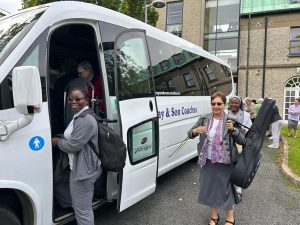 Our house has been alive these days, as delegates for Our General Chapter arrived on journeys from all over our MMM world.
Our house has been alive these days, as delegates for Our General Chapter arrived on journeys from all over our MMM world.
It reminds me of some of my own journeys. Towards the end of my first tour in Nigeria I was recuperating from illness in one of our communities and I got cut off from my own community when the Civil War began. Nobody knew what the future would bring. One of our Sisters was going home on leave so it was decided I should go with her and get well at home.
We set off early. After numerous delays of stopping and searching we reached the local airport to find all flights had been cancelled. We managed to get seats in a very crowded taxi to start our journey to Lagos. It was hazardous, stopping and checking every few miles. By nightfall we reached Benin and were warmly welcomed in a community of sisters there. Things were normal there so far and the Sisters were going out to some function. They gave us food and beds, told us to feel at home and went off.
Half an hour later we heard a car come in. Then we heard knocking on the front door and people talking. We looked down from the verandah. It was another car from the East, another MMM sister, a doctor, a young Irish nurse who was very ill and a priest whom I will call Hugh Walsh. It was not our house and we had no keys. We couldn’t do anything so they decided to go to the parish house and would check with us in the morning.
Next morning Fr. Hugh and the doctor arrived in a taxi, bound for Lagos. The nurse had been admitted in hospital and our Sister stayed with her so she could bring her home later when she was well enough to travel. We set off. Our journey to Lagos that day was another hazardous experience, more check points every few miles. The men at the check points were young and inexperienced, showing their new-found authority and were not easy to deal with. We were on the road all day and were so blessed to have Fr. Hugh. He sat in the front seat, was respectful and courteous throughout but spoke with authority and they listened to him. That made it so much easier for us.
In Lagos the doctor went his own way and we three got a flight home two days later. I never saw Fr. Hugh again but I remember his patience and strength.
Thirty eight years later I had a very different journey, this time in America on mission appeals. Sr. Anna and I arrived in Mobile, Alabama, on a Friday. A hurricane was forecast for the weekend. We got a warm welcome with Sisters who had a Nursing Home for their old and retired sisters. They were busy preparing for the hurricane. Everything movable outside had to be brought in, everything else secured and cars carefully parked. The storm was due to hit Mobil at midday on Sunday. We did go out for the Saturday Evening Mass but the wind was already very strong, people were boarding up their windows and preparing. Few came to Mass and we were so relieved to get back to the house safely.
On Sunday we all had an early lunch. Not knowing how long anything would take or what would happen we were given a snack and a torchlight, and all went to our rooms to wait out the storm. I couldn’t see much from my room, and I was curious. I ventured out and got to the sitting room. There I found old Sr. Brigid, watching television. She said “I always watch the hurricane coming in.” I started to watch too and I was literally fascinated. The sea was in turmoil, waves going miles into the sky and this ball of light moving inwards. I cannot explain such a spectacle. Brigid talked about the ’Eye of the Storm’. We sat there, just enthralled by what was happening.
Brigid and I got talking. She told me she was Irish, left home when she was 17 years old when nuns came searching for vocations. Now she was 95yrs old. She said “Those days when you went on mission you stayed on mission. There was no going home. I trained as a teacher, and all my life enjoyed teaching and working with young people”. She told me a lot about what she did and then she said, “And you, what do you do in Ireland?” I explained to her, that I actually worked in Nigeria. At that, she literally spun round to me and said. “Would you have known my baby brother, he was a priest in Nigeria?” Well, her baby brother was Fr. Hugh Walsh. I couldn’t believe it! I told her my story about Hugh.
Brigid was the eldest of a large family, Hugh was the youngest and was not born when she left home. She never saw Hugh until he was a priest and visited her in America after his ordination. After that he visited when he could. She was so thrilled to meet someone who knew him.
One never knows what any journey will bring and today all our delegates have set off on their journey to spend time listening to the Spirit of God and planning what God wants for the future of our Congregation. May it be a plan to make the world a better place, bring us some surprises and make God’s Tender Healing Love known to all with whom we come in contact.
Conflict and relationships
by Liana de Jesus, MMM Brazil 04.10.2025
 Conflict is part of life. When two people live together always, they will disagree with each other. I will give some examples: in religious communities, conflicts happen because religious people are normal people, with their limits and their ways of expressing love. In families, we also have conflict and disagreement between the husband, wife and children even the preference of children in the family. Amongst us as siblings we have our differences and disagreements etc. At the parish levels the different groups want to show their best and when they are not recognized it can bring conflict of interest. I am wondering how we can address the way of living and minimize or to avoid these in our relationships in a healthy way? Conflicts are not all negative, it be positive and helps us to become mature people and to grow in learning how to respect one another.
Conflict is part of life. When two people live together always, they will disagree with each other. I will give some examples: in religious communities, conflicts happen because religious people are normal people, with their limits and their ways of expressing love. In families, we also have conflict and disagreement between the husband, wife and children even the preference of children in the family. Amongst us as siblings we have our differences and disagreements etc. At the parish levels the different groups want to show their best and when they are not recognized it can bring conflict of interest. I am wondering how we can address the way of living and minimize or to avoid these in our relationships in a healthy way? Conflicts are not all negative, it be positive and helps us to become mature people and to grow in learning how to respect one another.
The choices we make to live together with other people demands responsibilities from each one of us in terms of taking the initiative to be a peacemaker, which must start from me. Nobody else. it demands courage for a person to express her ways of care and to love without fear. This can be one way to face our differences and to accept that conflict is part of life and discover ways to solve it. We need to have more meaningful conversations with one another because of how we understand conflict. We have learnt it is a negative and disturbed by emotions.
We need to educate the new generations the deeper meaning of relationships among family and our differences. Without losing our values we can learn from each other. However, this is a journey that demands commitment from all of us. If I take a step towards being the best I can be in community, family, workplace, and in groups at parish we all benefit from the mutual dialogue that allows us to understand history, motivations, challenges, past and current realities. All these are part of our lives and our world.
At family level we need to do our homework to develop a future with strategies where the parents respect their children, make their decisions openly and talk about the reality of life. Together they choose values that build meaningful relationships amongst themselves. Families are the essential building blocks of communities that provide the foundation for individuals’ growth, values, and opportunities. The support and love within a family extends beyond the household to contribute to the broader community’s cohesion and prosperity for a better world.
In the local parish and community, it is a place for us to feel at home, everyone is welcome to participate and to share their talents and gifts without competition or comparison who is best. We work together in to help build a Christian community. This will bring to the environment an opportunity for our children to learn joyful and meaningful relationships and promote a better world for all of us.
by Sr. Sheila Campbell MMM Ireland 01.10.2025
 I have a phrase that I sometimes use that delights one of my co-workers. It is: “It is easier to ask for forgiveness than for permission.” It speaks for a liberty of spirit and freedom from restrictive, unnecessary rules. Let me tell you how I learnt that phrase.
I have a phrase that I sometimes use that delights one of my co-workers. It is: “It is easier to ask for forgiveness than for permission.” It speaks for a liberty of spirit and freedom from restrictive, unnecessary rules. Let me tell you how I learnt that phrase.
One day, when I was a young Sister on mission, I was dithering about doing something a little bit differently. One of the more experienced Sisters said to me: “It is easier to ask for forgiveness than for permission: go ahead with your project.” She was not giving me permission – she had no authority to do so, but she was giving me words of encouragement and asking me to trust my own judgement.
Why is it that people seem to be divided into two groups – those who recklessly go ahead with their own plans and projects (like some of our politicians!) without regarding the consequences of their actions, and a second group who see so many difficulties ahead that they become paralysed and attempt nothing?
Often, I ask myself which of these two groups do I belong? I am tempted to say that I am among the second group. At times I need to be pushed, or at least strongly encouraged to set out on a new path. The old ways are so comfortable, aren’t they?
This is when I think back to Mary, going in haste to her cousin, Elizabeth, at her hour of need. She had no GPS to guide her, but she probably took someone along with her for protection on the road. But she went – and the Gospel says she “went in haste”. No dithering for Mary.
Mother Mary Martin, our foundress, was also a woman of action. She saw the need for care of women at the time of childbirth and for the promotion of family life. She went to World War 1 to nurse, and then on to Nigeria as a lay missionary.
Today we are also called to action – to save our planet, to work for peace and justice. We cannot do it alone. We need to work together with others, in coordinated action. We need to trust God to be with us as we struggle. But we are called to get up and do something.
So today I say “Forgive me – I am going ahead with my plans” and pray that God will guide me.
